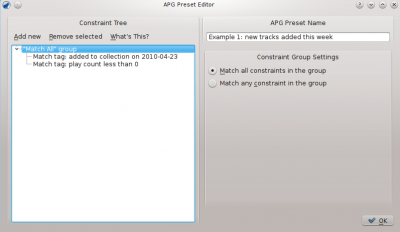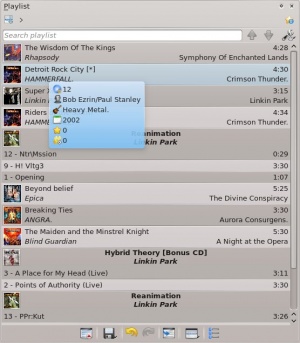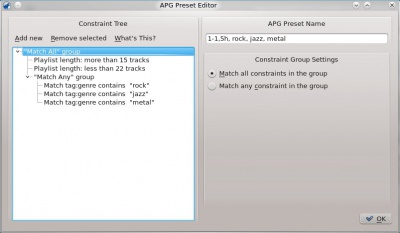Amarok/Manual/Lista de músicas/Gerador de listas de músicas automático
Gerador de listas de músicas automático
O Gerenciador de listas de músicas automático (APG) gera listas automaticamente com base nas restrições que você definir. Estas restrições podem ser definidas com base nos dados da música (artista, gênero ano) ou no tempo de acesso (última reprodução). Existem também restrições especiais para determinar como o Amarok vai procurar pelas músicas. Você encontrará o APG no seu painel Fontes multimídia, .
Barra de predefinições do APG

Esta é a barra de Predefinições do APG. Da esquerda para a direita, temos os seguintes botões:
 Adiciona uma predefinição em branco que poderá ser modificada.
Adiciona uma predefinição em branco que poderá ser modificada.
 Abre a janela do Editor de predefinições do APG para editar as restrições da predefinição selecionada.
Abre a janela do Editor de predefinições do APG para editar as restrições da predefinição selecionada.
 Remove a predefinição selecionada da lista; a ação não pode ser desfeita.
Remove a predefinição selecionada da lista; a ação não pode ser desfeita.
 Importa uma predefinição de um arquivo .xml. Tem o potencial de ser mal formado, caso seja editado fora do Amarok; use o teste das restrições.
Importa uma predefinição de um arquivo .xml. Tem o potencial de ser mal formado, caso seja editado fora do Amarok; use o teste das restrições.
 Exporta a predefinição selecionada para um arquivo .xml que possa ser posteriormente importado.
Exporta a predefinição selecionada para um arquivo .xml que possa ser posteriormente importado.
 Carrega o APG com a predefinição selecionada e gera uma lista de músicas automaticamente.
Carrega o APG com a predefinição selecionada e gera uma lista de músicas automaticamente.
Trabalhando com predefinições

As predefinições são conjuntos de regras que o APG do Amarok irá usar para gerar as listas de músicas. Estas regras serão usadas para o que se consideram restrições a partir de agora; cada predefinição é determinada com base nas restrições que a compõem. Os grupos de restrições organizadas de forma hierárquica e lógica são chamados de árvores de restrições.
Restrições
As restrições são os blocos de construção das árvores de restrições. São simples instruções que o APG irá usar para adicionar músicas à lista por ele gerada. Para adicionar uma restrição à árvore de restrições atual, clique no botão ![]() da Barra de predefinições do APG e clique na opção na janela do Editor de predefinições do APG. Lembre-se de que isto irá adicionar a restrição sob o item selecionado (restrição ou grupo de restrições).
da Barra de predefinições do APG e clique na opção na janela do Editor de predefinições do APG. Lembre-se de que isto irá adicionar a restrição sob o item selecionado (restrição ou grupo de restrições).
Tipos de restrição
Amarok APG supports several types of constraints:
| Constraint | Description |
|---|---|
| The most important constraints, because they can be set to virtually any information regarding the file, including: artist name, album name, genre, year, last played, and score. | |
| Set the running time (in HH:MM:SS format) that the playlist should have | |
| Determine how many songs should be in the playlist | |
| Tell Amarok where to start and stop looking for tracks | |
| Prevent Amarok from selecting the same tracks, songs from the same artist, or the same album |
Note that you can change how constraints work in various manners, such as setting the fuzzy-exact slider, which determines how closely the constraint is going to be followed.
Another way to modify constraints that is present on with a textbased tag is found in the line below the option box. In the text field to the right you write the text to be matched and in the option box at the left of the value you can select (which will consider any songs that have the according text in their tag), (which will consider songs whose corresponding tag match exactly the one in the text box), and .
Similarly, you can also edit the way value-based constraints (such as the constraints and the playcount constraint) behave by changing the option close to the text to settings such as , and .
Another way to change constraint behavior is to check the checkbox on them, this makes them behave the opposite way, a "Match Tag: artist contains name" becomes "Match Tag: artist not contains name".
Constraint Groups
Constraint groups can be added from the option from the APG Preset Editor window, constraints under a group are logically linked, the same applies to groups under groups. There are currently two kinds of constraint groups: "Match all" groups and "Match any" groups. "Match all" groups require that all the constraints under them are met by the song. "Match any" groups require that at least one of the constraints under them are met by the song. To add a constraint under a specific group highlight it on the preset editor and use the option.
Using your Presets
Once you set up a preset, you just have to select it on the APG Presets panel in the Automated Playlist Generator (APG) and click ![]() the toolbar to run APG with the selected preset. You will then have a playlist matching your criteria, like this:
the toolbar to run APG with the selected preset. You will then have a playlist matching your criteria, like this:


